#Arthur Koestler
Text
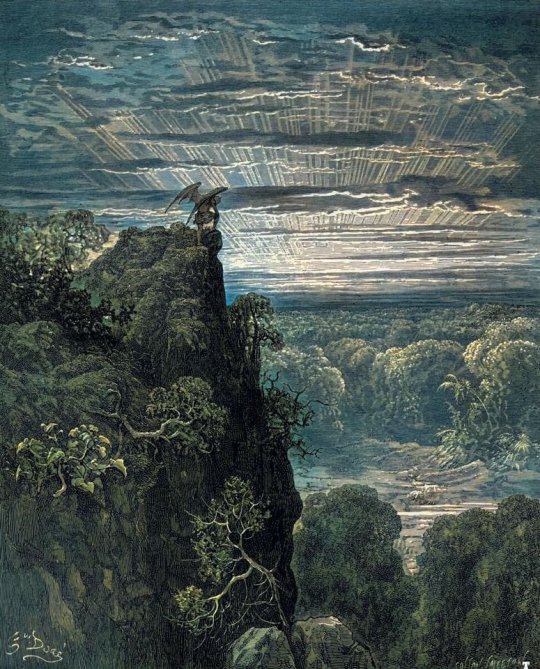
“Satan Overlooking Paradise” (1870) by Gustave Doré :: [Guillaume Gris]
* * * *
“Satan, on the contrary, is thin, ascetic and a fanatical devotee of logic. He reads Machiavelli, Ignatius of Loyola, Marx and Hegel; he is cold and unmerciful to mankind, out of a kind of mathematical mercifulness. He is damned always to do that which is most repugnant to him: to become a slaughterer, in order to abolish slaughtering, to sacrifice lambs so that no more lambs may be slaughtered, to whip people with knouts so that they may learn not to let themselves be whipped, to strip himself of every scruple in the name of a higher scrupulousness, and to challenge the hatred of mankind because of his love for it--an abstract and geometric love.”
― Arthur Koestler, Darkness at Noon
+
“It is wonderful how much time good people spend fighting the devil. If they would only expend the same amount of energy loving their fellow men, the devil would die in his own tracks of ennui.”
― Helen Keller, The Story of My Life
#Satan#gustave dore#Guillaume Gris#about art#quotes#Hellen Keller#Arthur Koestler#Darkness at Noon#The Story of My Life
75 notes
·
View notes
Photo

Arthur Koestler - The Roots of Coincidence - Picador - 1976
#witches#coincidentals#occult#vintage#the roots of coincidence#picador books#arthur koestler#1976#picador#roots#coincidence
218 notes
·
View notes
Text
çürümüş bir yüz benimki.
marguerite duras - l'amant
#edebiyat#kitap#blogger#felsefe#kitaplar#blog#kitap kurdu#şiir#charles bukowski#marguerite duras#l'amant#sevgili#lover#love letters#henry miller#seksus#simone de beauvoir#albert camus#franz kafka#milan kundera#oğuz atay#tutunamayanlar#didem madak#nilgün marmara#tezer özlü#aslı erdoğan#küçük iskender#william shakespeare#hamlet#arthur koestler
15 notes
·
View notes
Text

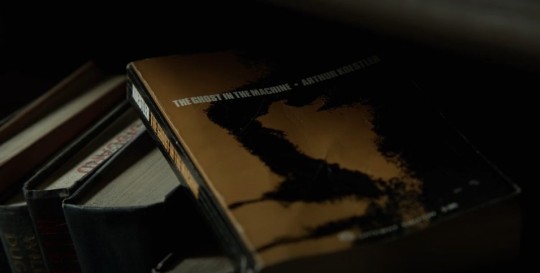
The Ghost in the Machine by Arthur Koestler
Person of Interest: "Number Crunch"
16 notes
·
View notes
Photo
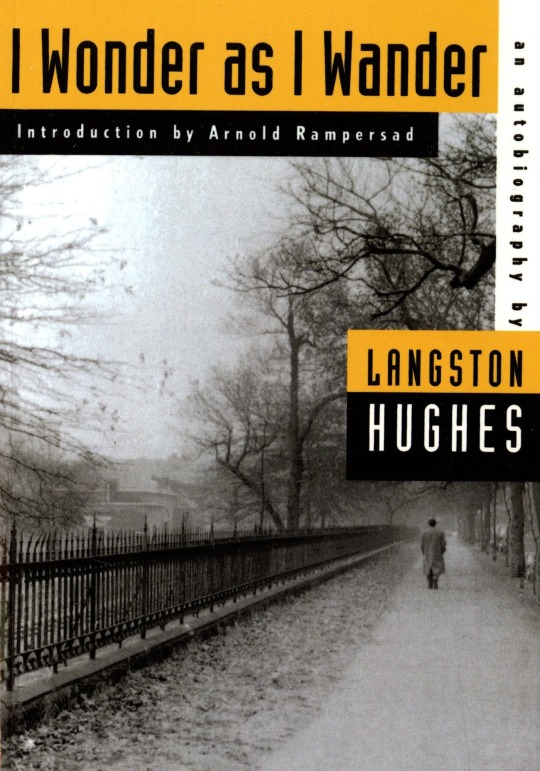
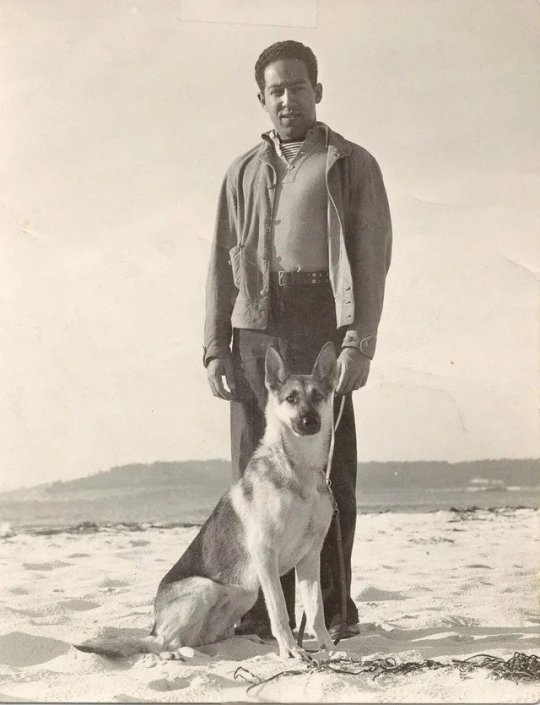
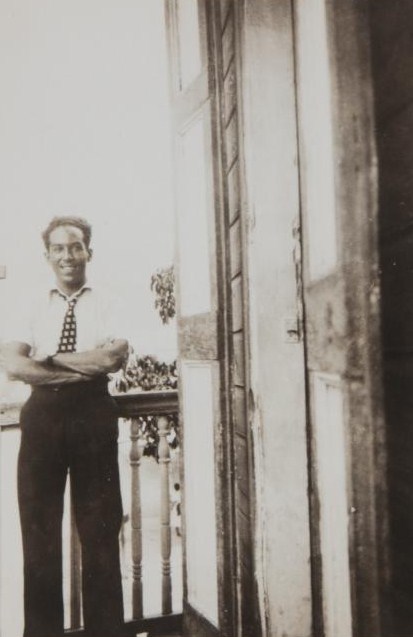

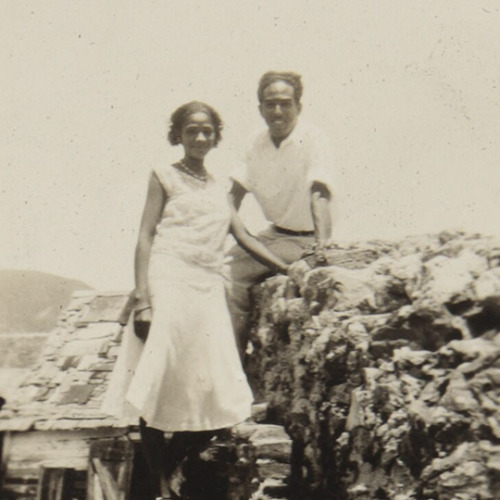
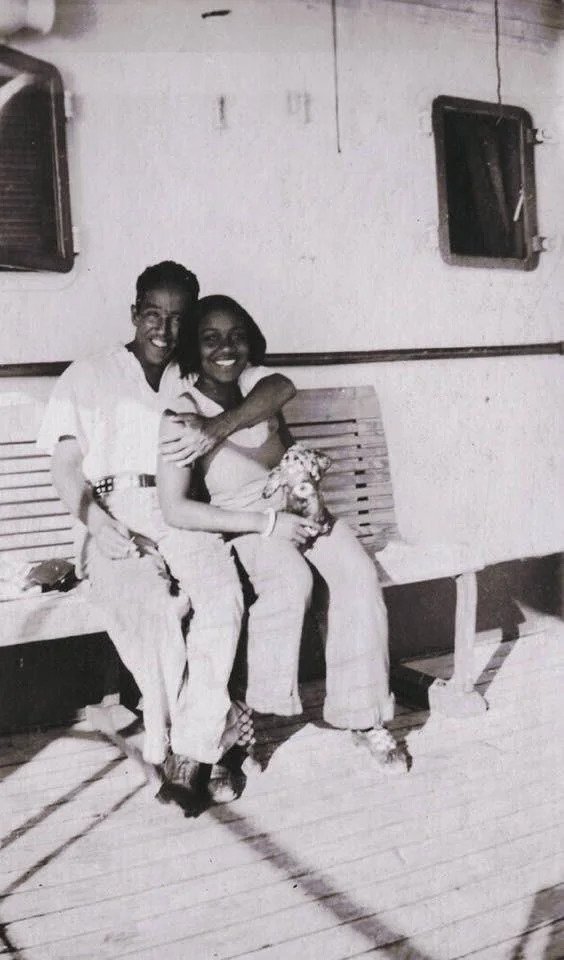

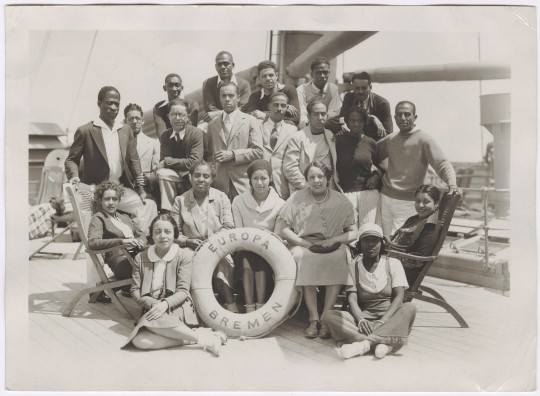
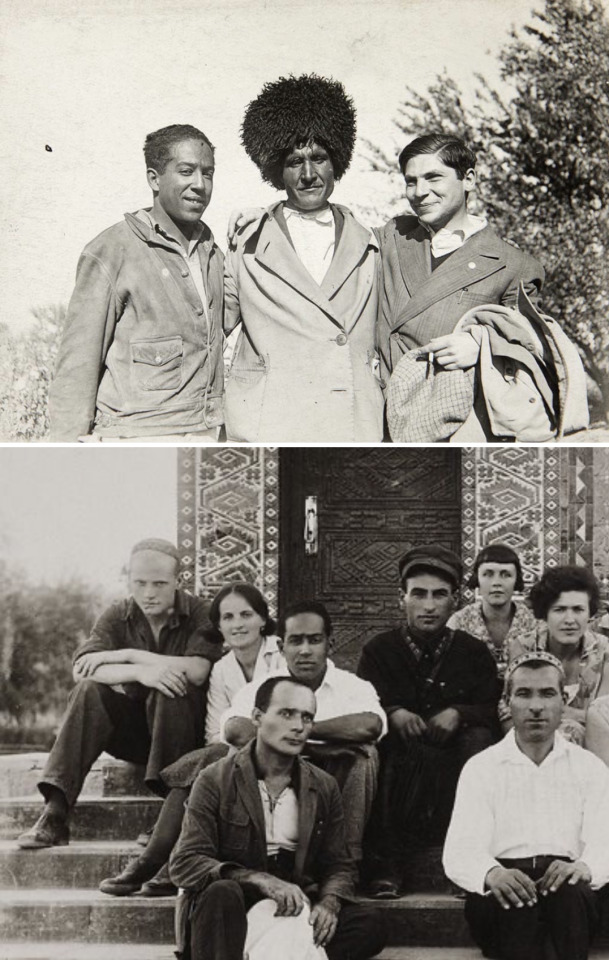
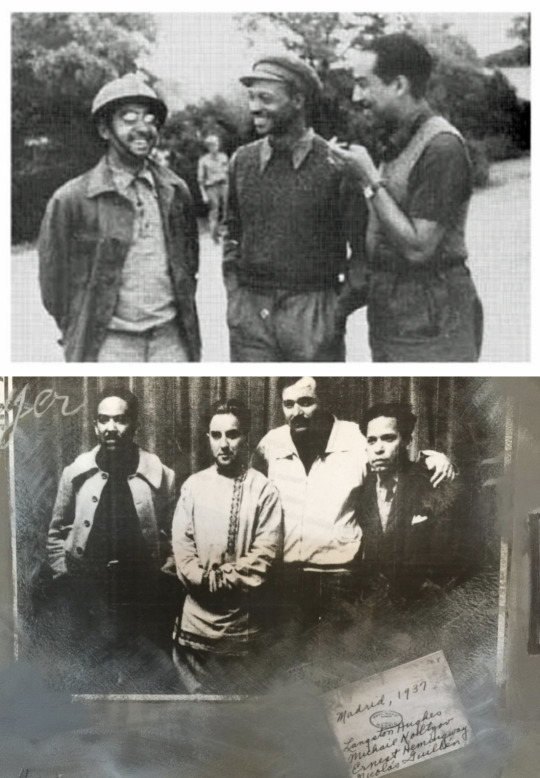
My Book Review
In his first memoir, The Big Sea, Langston Hughes unveils his self-portrait as a depressed, vulnerable young world traveler in his 20s in the 1920s, aiming to understand his family and sense of self against the barriers of society. His gift of words and will to finally be leads to his self-discovery, awakening, and budding friendships in the midst of examining the racial construct and class structures around him in various countries.
I Wonder As I Wonder is a continuation of his wanderlust spirit around the world into the 1930s. Langston paints a portrait of societal structures and cultures around the world —Cuba, Haiti, Russia, Soviet Central Asia, Japan, Spain — (even witnessing dictatorships and the Spanish Civil War) and within the US. He makes his imprint as a gifted wordsmith during the The Great Depression, meeting new and some familiar faces along the way.
Just as The Big Sea, I Wonder As I Wonder is a layered sensory book. You feel like you’re right there in the past as a curious world traveler, seeing through his eyes, taking field notes, witnessing the shaping of various countries and the way it translates to the daily lives of the people, and how it all compares/contrasts to today.
It's funny that upon concluding this memoir, Langston still writes about wanting to be a writer: “But that is what I want to be, a writer, recording what I see commenting upon it, and distilling from my own emotions a personal interpretation.” The thought of doing while actually doing. Journeying through the preceding pages with him, you understand it's really his longing to make his passion a successful earning career in spite of barriers. He did indeed.
SN: The photos aren’t included in book, but are pivotal to the details in the book.
Langston Hughes with dog on beach at Carmel, California (1934)
The next 3 photos are Langston Hughes in Haiti (1931)
The next 2 photos are Langston Hughes and Dorothy West in route to Russia (1932)
The Russian film company Meschrabpom's "Black and White" film team on the SS Europe (1932). Front row from left: Mildred Jones, Louis Thompson, Constance White, Katherine Jenkins, Sylvia Garner, Dorothy West, Mollie Lewis. Middle row from left: Wayland Rudd, Frank Montero, Matt Crawford, George Sample, Laurence Alberga, Langston Hughes, Juanita Lewis, Alan McKenzie. Back row from left: Ted Poston, Henry Lee Moon, Thurston Lewis, Lloyd Patterson, Loren Miller
Langston Hughes and German journalist Arthur Koestler (far right) on a cotton kolhoy in Soviet Central Asia (1932)
Langston Hughes in Ashgabat (1932)
Thaddeus Battle, former student at Howard University and activist in the National Negro Congress, Bernard “Bunny” Rucker, and Langston Hughes on the battlefield in Spain (January 1938)
Langston Hughes, Soviet journalist Mikhail Koltsov, Ernest Hemingway, Cuban poet and journalist Nicolás Guillén in Madrid, 1937
#langston hughes#I wonder as I wander#dorothy west#lloyd patterson#arthur koestler#ernest hemingway#thechanelmuse reviews#book review
75 notes
·
View notes
Photo
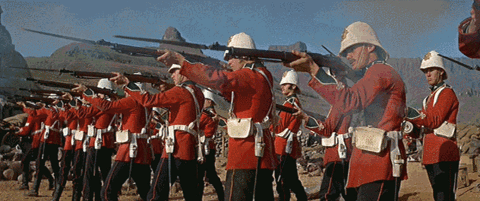
War is a ritual, a deadly ritual, not the result of aggressive self-assertion, but of self-transcending identification. Without loyalty to tribe, church, flag or ideal, there would be no wars.
- Arthur Koestler
I’m not sure I completely agree with Koestler because there’s also something innate within us that is twisted for selfish power and dominance (our original sin), but he has a point. Few would argue that the rituals used to wage war change with the times, but students of Clausewitz are skeptical about supposed changes in what we believe to be war’s enduring nature. According to the Prussian, war’s nature does not change - only its character. The way we use these words today can seem to render such a distinction meaningless, but careful attention to semantics can reveal real problems in how we think about war, society, and the future.
The nature of war describes its unchanging essence: that is, those things that differentiate war (as a type of phenomenon) from other things. War’s nature is violent, interactive, and fundamentally political. Absent any of these elements, what you’re talking about is not war but something else.
The character of war describes the changing way that war as a phenomenon manifests in the real world. As war is a political act that takes place in and among societies, its specific character will be shaped by the politics and culture of those societies - by what Clausewitz called the “spirit of the age.”
War’s conduct is undoubtedly influenced by technology, law, ethics, culture, methods of social, political, and military organisation, and other factors that change across time and place.
#koestler#arthur koestler#quote#war#battle#british army#victorian army#nation#nature of war#human condition#clausewitz#prussian#on war#philosophy#culture#politics
54 notes
·
View notes
Photo
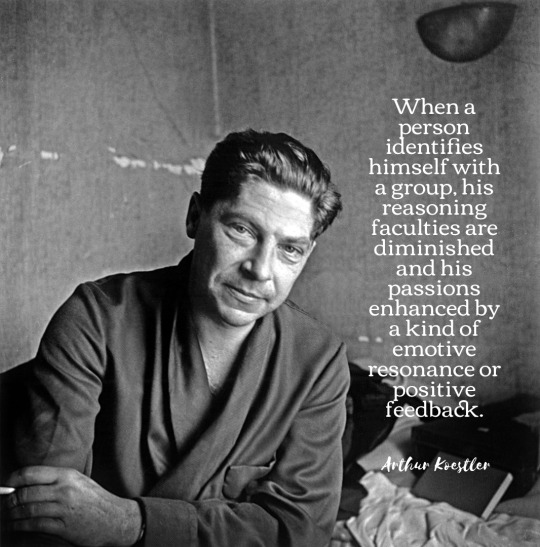
“When a person identifies himself with a group, his reasoning faculties are diminished and his passions enhanced by a kind of emotive resonance or positive feedback.“
-- Arthur Koestler
36 notes
·
View notes
Text
Nella morte la metafisica diventava reale.
Arthur Koestler, Buio a mezzogiorno
10 notes
·
View notes
Text

“When a person identifies himself with a group, his reasoning faculties are diminished and his passions enhanced by a kind of emotive resonance or positive feedback.”
– Arthur Koestler
6 notes
·
View notes
Text
Satan, on the contrary, is thin, ascetic and a fanatical devotee of logic. He reads Machiavelli, Ignatius of Loyola, Marx and Hegel; he is cold and unmerciful to mankind, out of a kind of mathematical mercifulness. He is damned always to do that which is most repugnant to him: to become a slaughterer, in order to abolish slaughtering, to sacrifice lambs so that no more lambs may be slaughtered, to whip people with knouts so that they may learn not to let themselves be whipped, to strip himself of every scruple in the name of a higher scrupulousness, and to challenge the hatred of mankind because of his love for it--an abstract and geometric love.
Arthur Koestler, Darkness at Noon
2 notes
·
View notes
Text
eli ayağı değil, beyni zincire vurulmuş olan köle.
arthur koestler - spartaküs
#kitap#edebiyat#blogger#felsefe#kitaplar#blog#kitap kurdu#karl marks#das kapital#arthur koestler#spartaküs#spatacus#rosa luxemburg#ernesto che guevara#nasıl yapmalı#nazım hikmet ran#bertolt brecht#üç kuruşluk opera#maksim gorki
15 notes
·
View notes
Text
''The true mark of genius is not perfection, but originality, the opening of new frontiers; once this is done, the conquered territory becomes common property.''
—Arthur Koestler
3 notes
·
View notes
Text
Gisèle Freund - Great Thinkers Part II

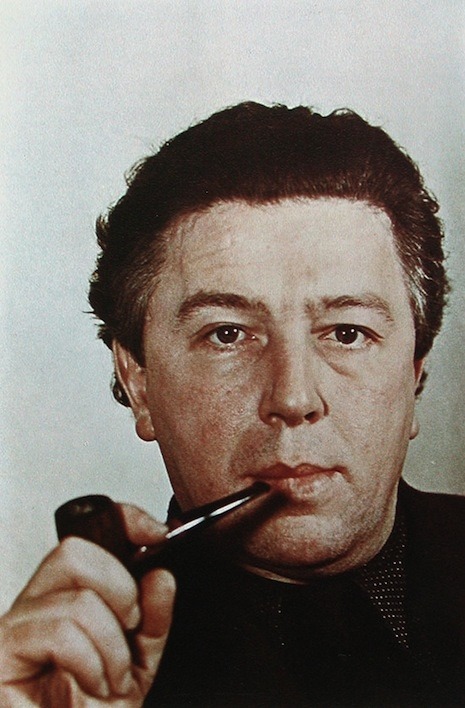



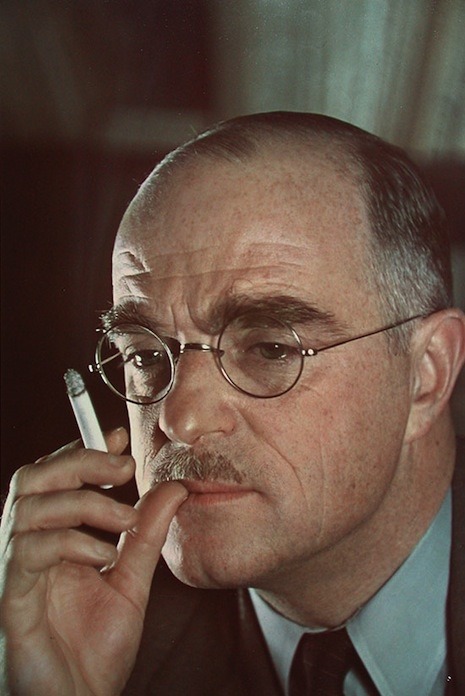

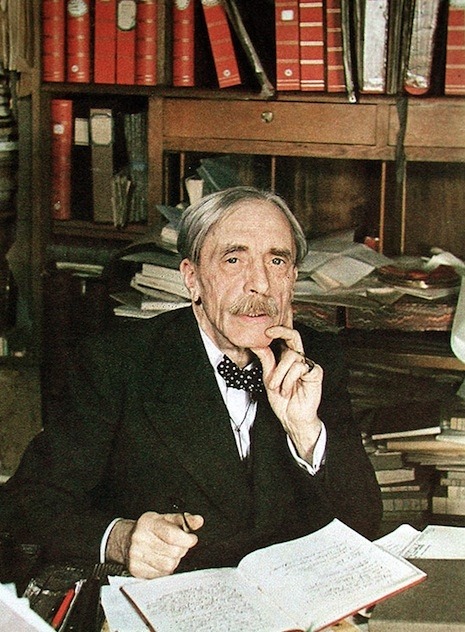
#Gisèle Freund#gisele freund#Freund#pierre bonnard#andre breton#arthur koestler#frida khalo#thornton wilder#marcel duchamp#duchamp#paul valéry
12 notes
·
View notes
Text
Our Press and our schools cultivate Chauvinism, militarism, dogmatism, conformism and ignorance. The arbitrary power of the Government is unlimited, and unexampled in history; freedom of the Press, of opinion and of movement are as thoroughly exterminated as though the proclamation of the Rights of Man had never been. We have built up the most gigantic police apparatus, with informers made a national institution, and the most refined scientific system of political and mental torture. We whip the groaning masses of the country towards a theoretical future happiness, which only we can.
Arthur Koestler
9 notes
·
View notes
Photo

“Faith is a wonderful thing; it is not only capable of moving mountains, but also of making you believe that a herring is a racehorse.”
-- Arthur Koestler
With “faith,” reality itself is no longer a guardrail.
#Arthur Koestler#faith#faith is delusion#faith is not a virtue#move mountains#religious faith#religion#religion is a mental illness
29 notes
·
View notes
